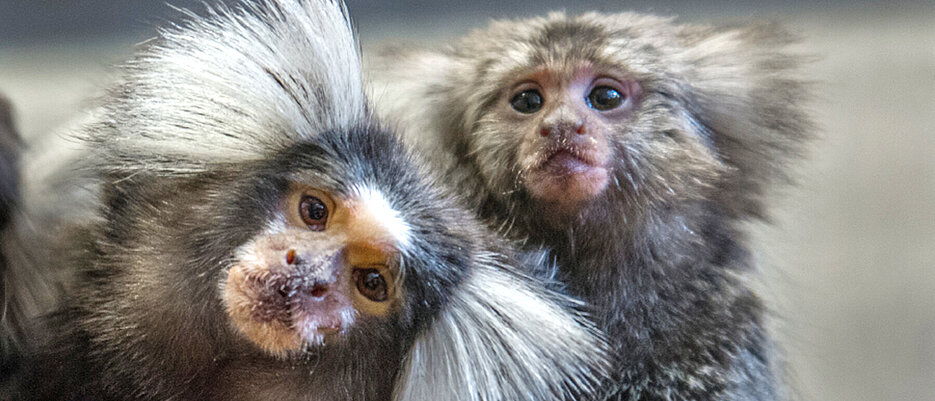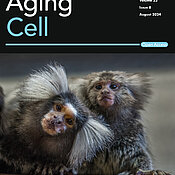Sperm Epigenome Has an Effect on Offspring
09/06/2024Numerous studies have shown that the older the father, the higher the risk of disease for the offspring. Human geneticists at the University of Würzburg have now taken a closer look at the processes responsible for this.

SPIEGEL writes about "Old fathers being a risk factor", "Late fathers have more sick children" is the headline in WELT. It has been known for a long time: The children of old fathers have an increased risk of birth defects and neurodevelopmental disorders, such as autism.
In a new study, scientists from Julius-Maximilians-Universität Würzburg (JMU) in collaboration with the German Primate Center in Göttingen and Cambridge University have now investigated and compared the effects of paternal age on the sperm of humans and a related primate species.
They have published the results in the journal Aging Cell, which has even made its cover picture available for the study. Professor Thomas Haaf, holder of the Chair of Human Genetics at JMU, was responsible for this study.
Environmental Factors Have an Effect on the Epigenome
"In our investigations, we focused on the epigenome of sperm," explains Thomas Haaf. Epigenetics is a form of inheritance that does not obey the Mendelian rules. In contrast to genetic changes, which affect the DNA sequence itself and are irreversible, epigenetic inheritance is based on reversible biochemical modifications of the DNA, in particular DNA methylation.
The epigenome, i.e. the sum of all epigenetic patterns, regulates gene activity in a cell. The epigenome is influenced by intrinsic factors, for example during the development and differentiation of cells. However, environmental factors such as diet, physical activity or smoking also have an effect on the epigenome. "Previous studies have shown that a large number of sperm DNA methylation patterns change with increasing paternal age," explains Thomas Haaf. This could have an impact on the next generation and is associated with an increased risk of disease.
Comparison of the Sperm of Common Marmosets and Humans
The team from the Department of Human Genetics at Würzburg University compared sperm from humans and common marmosets (Callithrix jacchus). This primate species belongs to the marmoset family and lives in north-eastern Brazil. With a size of 16 to 20 centimeters, the animals only weigh a maximum of 300 to 350 grams; they live a maximum of 15 years.
For Haaf, they are of interest for another reason: "Until now, mice have mainly been used in reproductive research to investigate common epigenetic signatures between fathers and their offspring," explains the scientist. However, due to the major differences between humans and rodents, it is difficult to transfer the results of the mouse model to humans.
In contrast, the common marmoset is very well suited for the study of reproduction, ageing, neurodevelopment, and infectious diseases. "Although Callithrix and humans diverged more than 40 million years ago, their chromosome sets and genome sequences are surprisingly similar. Due to their small size and compressed lifespan, breeding and husbandry of Callithrix is also much easier and cheaper than for other primates," says Haaf. Together with his team, he has now investigated the question of whether specific age-related processes in the epigenome of human sperm also occur in non-human primates.
Species-specific Changes in the Sperm Epigenome
One central finding of the recently published study is that although the vast majority of the more than 13,000 analyzed genes shows identical sperm DNA methylation patterns in Callithrix and humans, around 300 genes are over- or under-methylated in a species-specific manner. "Particularly striking among these are genes for glycosphingolipid biosynthesis, which plays an important role in stem cell differentiation and early development," says Haaf.
The species-specific methylation patterns in the sperm epigenome are associated with expression differences in early embryonic stages and blastocyst tissues of Callithrix and humans. "There is growing evidence that such species-specific differences in the sperm epigenome enable rapid adaptation to different environments within a few generations, which can then be passed on epigenetically to the next generation," says the human geneticist. Genetic evolution works over much longer periods of time compared to epigenomic evolution.
Paternal Age Effects are also Species-specific
Another important result is the identification of 204 genes in Callithrix and 27 in humans, whose methylation is dependent on paternal age. "Interestingly, not a single one of these genes is methylated in the same age-dependent manner in both species," says Haaf. The paternal age effect is therefore also specific to the respective species.
In humans, these genes with age-dependent methylation patterns are primarily associated with the development of the nervous system. The scientists therefore suspect that epigenetic evolution has optimized these genes for human brain development and cognitive abilities that distinguish humans from primates. It is therefore not surprising that these genes and paternal age play a role in neurodevelopmental disorders.
Publication
Age-related and species-specific methylation changes in the protein-coding marmoset sperm epigenome. Marcus Dittrich, Laura Bernhardt, Christopher A. Penfold, Thorsten E. Boroviak, Charis Drummer, Rüdiger Behr, Tobias Müller, Thomas Haaf. Aging Cell, https://doi.org/10.1111/acel.14200
Contact
Prof. Dr. Thomas Haaf, University of Würzburg, institute for Human Genetics, T: +49 931 31-88738, thomas.haaf@uni-wuerzburg.de







